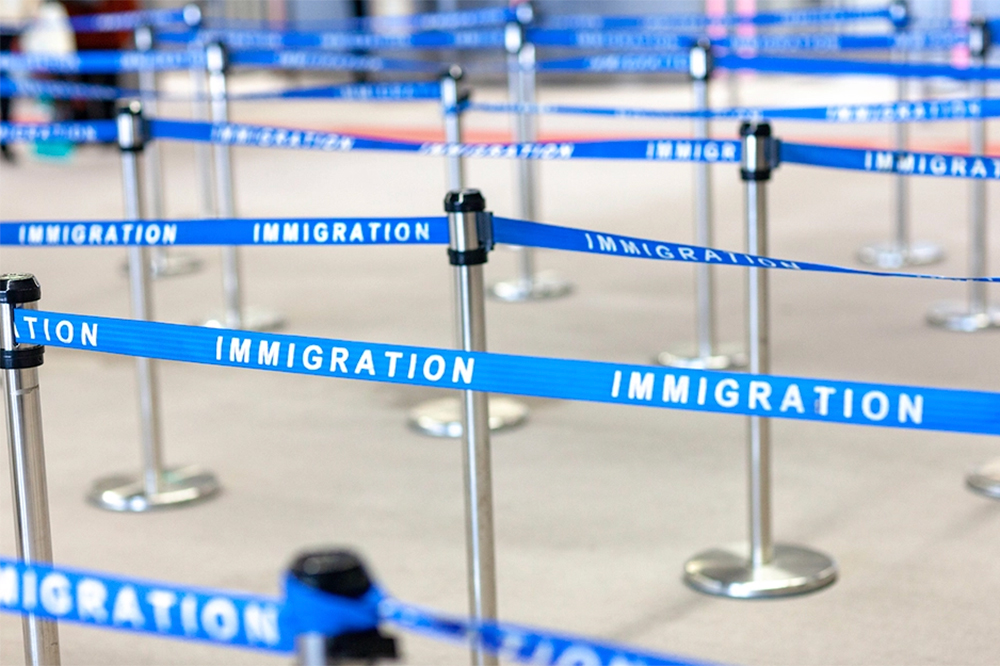Human trafficking is a multi-billion-pound global industry. It is fuelled by the desperation of migrants seeking a better life and the cynicism of those who are now adept at identifying and exploiting loopholes in western border controls.
One of Germany’s proposals is to explore copying the British model and process asylum applicants elsewhere
As ever larger waves of migrants cross the Mediterranean, Rishi Sunak has told European leaders that their efforts at policing illegal migration are ‘not working’ – because there is no shortage of poor people willing to pay smugglers for their ‘barbaric enterprise’. He has raised difficult questions about how the rich discharge their duty to the poor in a world with about 100 million displaced people. The old postwar settlement is utterly unfit for the new global dynamics of migration flows.
Taking in more legal refugees and deporting those who arrive illegally would break the people traffickers’ model and, as Britain’s experience with Albania shows, that works. People would not pay £5,000 to travel to the United Kingdom if there was a realistic chance of ending up in Rwanda. The Rwanda plan is an imperfect and in many ways cruel solution, but it is less cruel than allowing thousands to drown in the sea or to start journeys which may result in them being in hock to gang-masters.
This week, German Chancellor Olaf Scholz emerged from a marathon negotiation with the heads of Germany’s states to come up with a new deal intended to cut illegal migration. One of the proposals is to explore copy-ing part of the British model, and process asylum applicants in other countries. Denmark is already exploring this. The Sunak model – based on Australia’s success in fighting people-smuggling – is taking off.
Last week, the Austrian government signed an agreement to co-operate with the UK government on the offshore processing of asylum applicants. Italy, too, has expressed interest in the Rwanda scheme, and has done its own deal with Albania to process 3,000 asylum applications at a time there. Giorgia Meloni, Italy’s Prime Minister, says her deal can stand as a model in how to move migrants outside EU territory.
Now and again, British politicians say that the issue is so important – and the scandal of migrant deaths so huge – that we cannot allow what parliament decides to be thwarted by the European Court of Human Rights (ECHR) in Strasbourg. Jonathan Sumption, a former Supreme Court judge, recently argued in this magazine that the ECHR’s processes are questionable enough to merit our withdrawal from the court.
At first, talk of leaving the ECHR prompted horror: could Britain put itself alongside Belarus and Russia in the sin bin of justice systems? Let us set aside that English law is already used as a global golden standard – which is why deals between two foreign countries are often agreed in London courts. The more pertinent point is that other European countries are now also thinking it’s time to place the wills of their parliaments and their voters above that of Strasbourg.
French interior minister Gérald Darmanin has announced that his government may in future simply deport illegal migrants deemed to be a threat to the country before they have had a chance to appeal to the ECHR.
What has changed? Reality has set in. The German experiment of 2015, when Angela Merkel opened her country up to vast numbers of new arrivals, underlined the fact Europe is not equipped to accept large inflows. It would take only a small proportion of the world’s 100 million displaced to make the journey to Europe for the continent’s welfare systems to be overwhelmed.
This does not mean washing our hands of our moral duty to help people in distress. On the contrary, the money European countries spend supporting asylum applicants on home soil could more effectively be spent helping refugees closer to their homelands. Indeed, this is exactly Britain’s policy: to increase our help for refugees in the immediate vicinity of Syria and elsewhere, while simultaneously discouraging illegal migration across the Channel.
Britain does also have a duty to accommodate refugees. To that end, Sunak should say that we will fly in two legitimate refugees whose cases have been assessed abroad for every person deported to Rwanda. The question is not whether we help the world’s dispossessed, but how.
There are reasonable objections to the UK government’s Rwanda scheme. Is that really the right country to be sending refugees to for resettlement, given its history of genocide? Might a Meloni-style deal with Albania be better? Should asylum-seekers sent to Rwanda really be barred from settling in Britain even if their applications are successful, as is the current plan?
But no one can claim any more that the Tories have made Britain into an outlier whose policy on migration is horrifying other European countries. Sunak can claim to have a more effective solution than his critics are able to propose – and in doing so, he has set the terms of debate in the most important issue of our time.






Comments